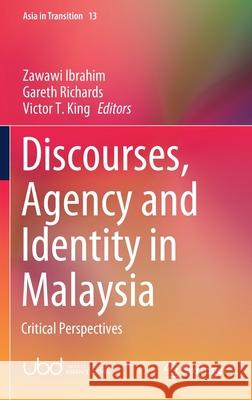Discourses, Agency and Identity in Malaysia: Critical Perspectives » książka
topmenu
Discourses, Agency and Identity in Malaysia: Critical Perspectives
ISBN-13: 9789813345676 / Angielski / Twarda / 2021 / 493 str.
Discourses, Agency and Identity in Malaysia: Critical Perspectives
ISBN-13: 9789813345676 / Angielski / Twarda / 2021 / 493 str.
cena 644,07 zł
(netto: 613,40 VAT: 5%)
Najniższa cena z 30 dni: 578,30 zł
(netto: 613,40 VAT: 5%)
Najniższa cena z 30 dni: 578,30 zł
Termin realizacji zamówienia:
ok. 16-18 dni roboczych.
ok. 16-18 dni roboczych.
Darmowa dostawa!
Kategorie:
Kategorie BISAC:
Wydawca:
Springer
Seria wydawnicza:
Język:
Angielski
ISBN-13:
9789813345676
Rok wydania:
2021
Wydanie:
2021
Numer serii:
000782157
Ilość stron:
493
Waga:
0.99 kg
Wymiary:
23.39 x 15.6 x 3.17
Oprawa:
Twarda
Wolumenów:
01
Dodatkowe informacje:
Wydanie ilustrowane
in representations of identity and nationhood in Malaysia, and for those with wider interests
in the fields of critical cultural studies and discourse analysis.
“Here is a fresh, startling book to aid the task of unbinding the straitjackets of ‘Malay’, ‘Chinese’
and ‘Indian’, with which colonialism bound Malaysia’s plural inheritance, and on which the
postcolonial state continues to rely. In it, a panoply of unlikely identities—Bajau liminality,
Kelabit philosophy, Islamic feminism, refugee hybridity and more—finds expression and offers
hope for liberation.”
—Rachel Leow, University of Cambridge
“This book shakes the foundations of race thinking in Malaysian studies by expanding the range
of cases, perspectives and outcomes of identity. It offers students of Malaysia an examination
of identity and agency that is expansive, critical and engaging, and its interdisciplinary depth
brings Malaysian studies into conversation with scholarship across the world.”
—Sumit Mandal, University of Nottingham Malaysia
“This is a much-needed work that helps us to take apart the colonial inherited categories of race
which informed the notion of the plural society, the idea of plurality without multiculturalism.
It complicates the picture of identity by bringing in religion, gender, indigeneity and sexual
orientation, and helps us to imagine what a truly multiculturalist Malaysia might look like.”
—Syed Farid Alatas, National University of Singapore











